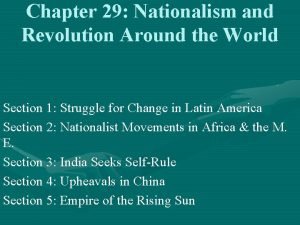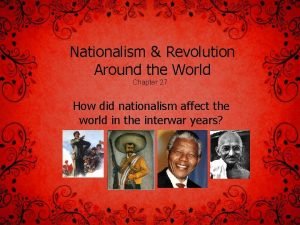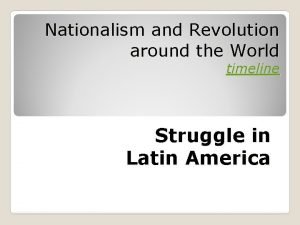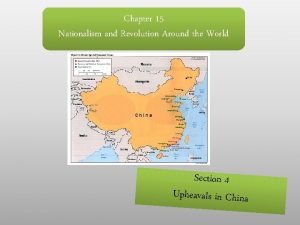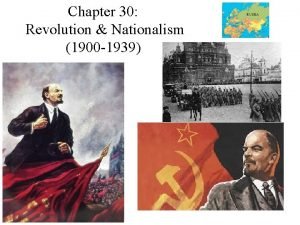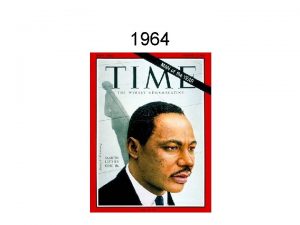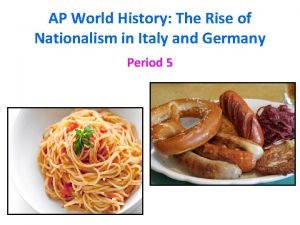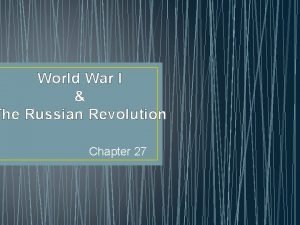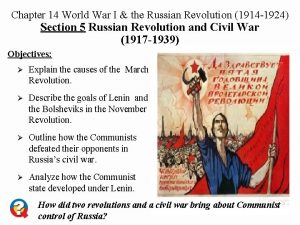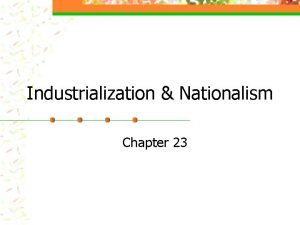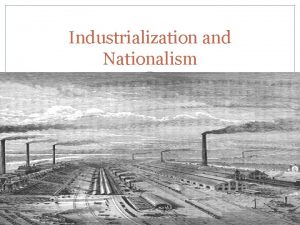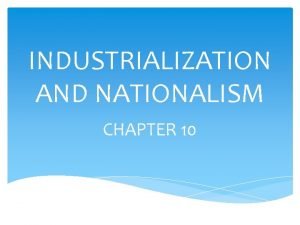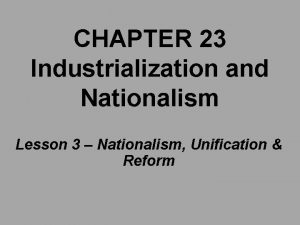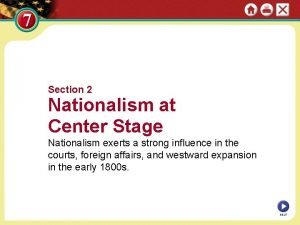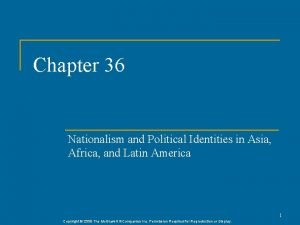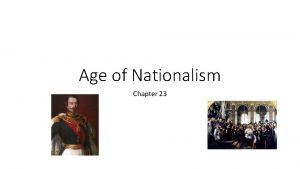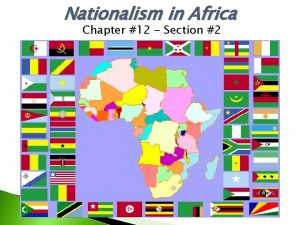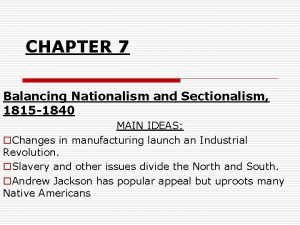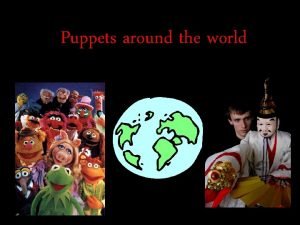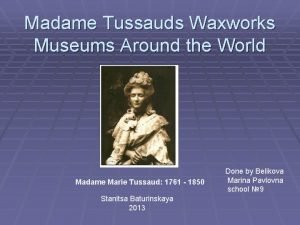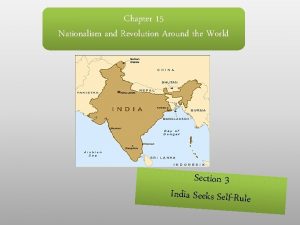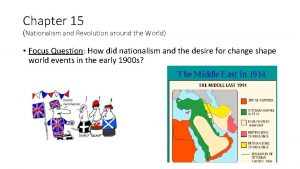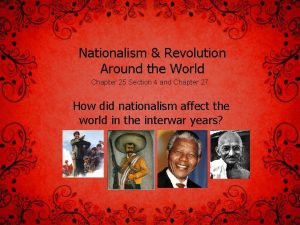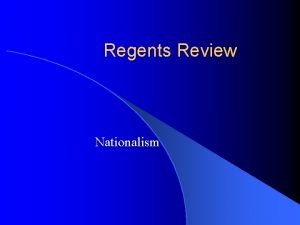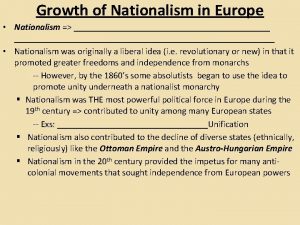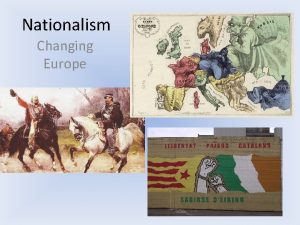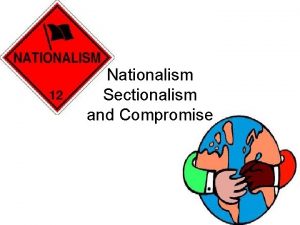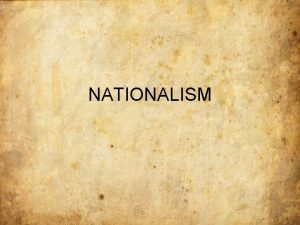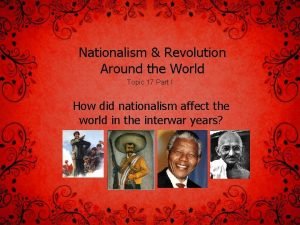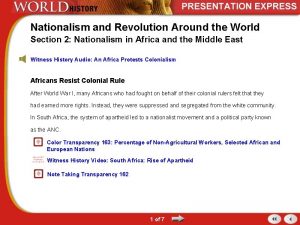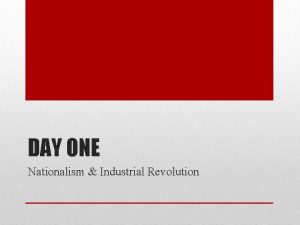Nationalism Revolution Around the World Chapter 27 How
































- Slides: 32

Nationalism & Revolution Around the World Chapter 27 How did nationalism affect the world in the interwar years?

Section 1: Struggle for Change in Latin America • The Mexican Revolution • What were the causes? – Secondary Causes – Sources of discontent • Wealthy landowners benefited • Peasants living in deep poverty • No land or education • Peasants, factory workers (earned meager wages) and middle class liberals (democracy) – resented Diaz dictatorship – Primary Causes: • Francisco Madero – 1910 demands free elections • Diaz resigns in 1911 • Madero becomes president but is murdered in two years • Struggle for power Radical leaders – North – Pancho Villa – fought for personal glory, but won many followers – South Emiliano Zapata – Indian tenant farmer demanded land reform for peasants

Effects of the Mexican Revolution • What were the effects? – 1. Much bloodshed and death – 2. 1917 – Venustiano Carranza conservative – elected president • Constitution – – Addressed 3 major issues: land, religion and labor » Nationalization – government take over of natural resources » Broke up large estates » Limits foreign ownership of Mexican land » Returns some Indian lands » Gives government control of church land » Sets minimum wage for workers » Protects the right of workers to strike » Gives all men the right to vote » Grants women some new rights

Effects of the Mexican Revolution • 3. Social Reforms – Schools and libraries were set up – Helped some Indian communities regain lands – Supported labor unions • 4. Economic nationalism – emphasis on domestic control of the economy • Determined to develop own economies and economic dependence. – After WWI trade fell off with Europe – Great depression – no demand for LA goods – price of imports rose • • • Local entrepreneurs set up factories Urged government to raise tariffs Other LA nations follow Mexico’s lead Limited success 5. Cultural Nationalism – Pride in ones own culture – Murals on buildings – Diego Rivera

The Good Neighbor Policy • During the Mexican revolutions the US supported leaders who it thought would protect its investments • In the 1930’s, Franklin Roosevelt abandoned the Roosevelt corollary • Which had been used to justify American intervention • US withdrew troops in Haiti and Nicaragua • Lifted the Platt amendment in Cuba – Pro-American Sentiment

Section 2: Nationalist Movements in Africa and the Middle East • Resentment after World War I – Why? • Colonial Powers sought to strengthen ties and increase exploitation Kenya – ID Cards White settlers forced Africans off the best land Restricted where they could live and travel Africans forced to work on plantations to pay taxes Lost self – sufficiency and dependent on European goods – Land converted to cash crop growers – – – Many western – educated Africans could not hold the best jobs – Excluded from political life

Resistance • Squatters – settled illegally on white – owned plantations • Formed unions • Some read Lenin’s works and believed that imperialism was the final stage of a corrupt capitalistic society – Socialism had found a new audience

Apartheid in South Africa • Apartheid – Goal – Ensure White economic power – Restricted better paying jobs for whites – Black South Africans had to carry Id badges – Evicted from the best land – The little voting rights that some educated blacks had were taken away • Nationalistic Movements – African churches and newspapers demanded rights – 1912 – Formation of the African National Congress (ANC) – Efforts so far had no effect on the white government of S. Africa

Pan - Africanism • Pan – Africanism – unity of people of African descent • Pan – African Congress - W. E. B. Dubois – Forge a united front – Met in Paris @ the Peace conference – During the Allied conference – Called nations to sign a charter of rights for Africans. – Western powers ignored demands • Negritude Movement • French Speaking countries in Western Africa and the Caribbean celebrated African’s cultural heritage

Egypt WWI – Provided food and workers to help Britain United behind Wafd party Islamic Brotherhood brought Islamic nationalism to Egypt 1922 the British finally agreed to declare Egypt independent • Troops stayed there to guard the Suez Canal and was the real power behind the king • •

Modernization in Turkey & Iran • Mustafa Kemal – Ataturk – “Father of the Turks” – Overthrow western occupation – Declared Turkey a republic – goal was to Modernize Turkey along western lines and create a secular state that separated religion from government

Ataturk & Turkish Modernization • Westernization – Secularization – Replaced Islamic Law with new law code based on European models – Forced people to wear western clothing – Replaced Arabic with western script – Closed religious schools and opened state runned schools – Women – no longer had to veil their faces • Allowed to vote • Polygamy outlawed • Freedom to work outside the home – Industry expanded • Hired westerners to advise n how to make Turkey economically independent

Iran • Reza Khan – a navy officer overthrew Shah – Pahlavi Dynasty • Rushed to modernize Iran – Won better terms from Britain company that controlled oil – Strengthened army – Transportation System – W. Alphabet – Western Clothing – Encouraged women to take part in public life – Muslim religious leaders condemned efforts

Arab Nationalism & The Mandates • Pan-Arabism – built on shared Arab heritage • Recalled the golden age of Arab history – sought to free Arabs from foreign domination • At Peace conference Ottoman minorities promised independence – not administered

Palestine & The Balfour Note • Zionist movement – During WWI – vague promises from Britain • Promised Arabs own kingdoms in former Ottoman lands • Balfour Declaration 1917 – to win support of European Jews – Supported the idea of setting up a national home for the Jewish people without doing anything that may predjustice the civil and religious rights of the existing non-Jewish communities – 1930’s – Rise of anti-Semitism in Europe – Seek safety in Palestine – Some Jews bought land from Arab landowners and then forced Arab tenant off the land – Jewish factory owners refused to hire Arabs

Section 3: India Seeks Self Rule • • • Amritsar Massacre: Causes: – British General Dyer had outlawed public meetings – Peaceful crown gathers and British open fire and kill over 350 and wound over a thousand – Britain promised Indians greater self government after the war, but they never fulfilled that promise Effects: – Indian feelings in the INC changed from pushing for self rule to full independence from Britain

Mohandas Gandhi • • Joined a law firm in S. Africa – faced racial predjustice Fought laws with non-violent resistance – Satyagraha “Soul Force” (his nonviolent passive resistance) – Ahisma – ancient doctrine of non-violence and respect for life – Rejected Caste system inequalities and embraced western thought such as democracy and nationalism as well as Christian thought – Refused to obey unjust laws – civil disobedience – Organized boycotts of British goods – especially textiles and encouraged people to wear home spun cotton clothing (called a dhoti) – Symbol is the spinning wheel

The Salt March • Causes: – British Salt Monopoly – could only buy British Salt – Indians were forbidden to touch the salt on the coast • Events – March 12 – March to the sea gathered followers as they marched – April 6 – Gandhi touched the salt on the coast and was jailed

The Salt March • Effects: – Followers sold salt on the streets – Countries began writing stories about the brutality administered to the Indians by the British • How do you think Indians were viewed in newspapers around the world? – Non-violence persevered and Britain began to hand over power to the Indians

Muslim vs. Hindu • • • Tensions between the two groups – Muslim League – Muhammad Ali Jinnah • Supported a separate Muslim state Tensions lead to Britain partitioning the subcontinent – Pakistan for the Muslims and India for the Hindus – Britain worked to keep the population divided, why? – Sikh and Hindu mobs slaughtered Muslims going into Pakistan, Muslims massacred Hindus Gandhi used satyagraha to try and restore peace – Famous hunger strike – He was killed by a Hindu extremists in 1948

Section 4: Upheavels in China • • The Chinese Republic – 1911 Qing dynasty collapsed – Sun Yixian hoped to rebuild China based on the Three Principles of the people Internal Problems – 1912 Sun Yixian steps down in favor of a powerful General Yuan Shikai • Hoped Yuan would restore order and set up a strong central government – He tried to set up a dynasty with him as emperor – military did not support him – Foreign Imperialism • During this time of chaos, foreign powers increased influence over Chinese affairs • Ports dominated by foreign merchants, missionaries and soldiers • Japan – 1915 – During World War I – Japan presented Yuan Shikai with 21 demands – goal was to make China a Japanese protectorate – Japan finally given German possessions – When he died in 1916 the country was plunged into civil war

May Fourth Movement • • 1919 – Goal was to Strengthen China Student protests against imperialism erupted on Beijing and later spread in China Students organized boycotts of Japanese goods. – What do you think their goal was? – How is China going to fight off European influence and imperialism? • Look to West to modernize – looked to democracy and nationalism to solve China’s problems Women campaigned to end arranged marriages, footbinding and the seclusion of women in the home

Marxism in China • Marxism – Why would Marxism appeal to the Chinese? – USSR more than willing to train Chinese to become vanguard or elite, leaders of the communist revolution. – Russian revolution model of how a strong wellorganized party could transform a nation – 1920 s – Chinese communist party formed

The Guomindang • • Sun Yixian – Guomindang (Nationalists) – Gov’t in S. China – Wanted to defeat the warlords and reunited China – Western powers ignored please for help in building a democratic China Sun Yixian dies in 1925 – Jiang Jieshi (Chang Kai-Shek) takes over as head of the Guomindang – 1926 succeeds in marching into N. China - Guomingdang – support of the landlords and business leaders – Communists winning converts of the small proletariat – 1927 – Guomingdang slaughtered Communist party members and workers who supported them – Result of this massacre was a civil war that lasted 22 years

Mao Zedong • Mao believed that communists should seek support not among the small urban working class but among the large peasant masses. Why? • Mao and the communists organized peasants in S. E. China – giving them land, schooling and healthcare • Jiang Jieshi wanted to destroy “Red Bandits” – Extermination campaign

Marxism in China • • The Long March – 1934 Mao and 100, 000 followers fled the Guomingdang – Faced daily attacks – Symbol of communist heroism – Soldiers had to follow three main rules: • Obey orders, “do not take anything from the people and turn in everything you capture • In additions, treat peasants politely, pay for goods they wanted and avoid damaging crops In the end communists set up base in remote area of N. China

Japanese Invasion • Japanese invasion – 1931 – Japan invades Manchuria in N. E. China – Jiang’s own generals didn’t understand why they would continue to fight other Chinese (communists) when they should be working together to fight the Japanese – Forced to Combine efforts – 1937 Japan strikes again – overran eastern china • Set up Puppet government in Nanjing – former nationalists capital • Brutality into the city- “Nape of Nanjing” • Japanese killed hundreds of thousands of soldiers and civilians – and they brutalized still more.

Section 5: Empire of the Rising Sun • 1920’s – Japan moving toward greater democracy – Emperor Hirohito 1929 -1989 – Political parties grew stronger / elected members of the Diet exerted their power – 1925 – Adult men won the right to vote – Women’s suffrage 1947

Empire of the Rising Sun • Economic growth – During WWI – Japanese economy grew – trade with allies – Zaibatsu influenced politics 1920’s – Pushed for policies to favor international trade and their own interests – Japan signed agreement with the US and Britain to limit the size of its navy – in the spirit of world peace

Empire of the Rising Sun • Serious problems – Economy grew slowly after WWI – DISCONTENT • Rural peasants enjoyed none of the prosperity of city – dwellers • Factory workers – low wages – Attracted to socialism – Younger generation in cities adopted western fashions and rejected family authority – During the 1920’s Conservatives (military officers) blasted government corruption, including payoffs by powerful zaibatsu • Condemned western influences for undermining basic Japanese values of obedience and respect for authority

Empire of the Rising Sun • • Economic disaster – Military and Ultranationalists condemned politicians for agreeing to western demands to stop overseas expansions – Outraged by Racial policies in the US – Took great pride in their achievements and history and resented the treatment by the Americans – Nationalists wanted to expand – Raw materials and land for population Militarists in power – Military leaders plotted to overthrow the government – Briefly occupied Tokyo – Civilian government survived but by 1937 forced to accept military domination – Cracked down on socialists and most democratic freedoms – Revived ancient culture and built a cult around the emperor who was believed to descended from the Sun goddess

Empire of the Rising Sun • Renewed Expansion – 1939 - WWII spread to Asia – Manchurian Incident 1931 • Set up explosives on Japanese owned Railroad tracks • Claimed China did it • Japanese took over • Set up a puppet government Manzhouguo – League of Nations condemned activity
 Nationalism and revolution around the world
Nationalism and revolution around the world When did mao take over china
When did mao take over china Nationalism and revolution around the world
Nationalism and revolution around the world Nationalism and revolution around the world
Nationalism and revolution around the world Russian revolution vocabulary
Russian revolution vocabulary كما تدين تدان english
كما تدين تدان english Goes around comes around meaning
Goes around comes around meaning Nationalism ap world history
Nationalism ap world history Nationalism ap world history
Nationalism ap world history Academic life around the world chapter 1
Academic life around the world chapter 1 World war 1 and the russian revolution chapter 27
World war 1 and the russian revolution chapter 27 Chapter 14 world war 1 and the russian revolution
Chapter 14 world war 1 and the russian revolution Russian revolution vs french revolution
Russian revolution vs french revolution How could the french revolution have been avoided
How could the french revolution have been avoided Third agricultural revolution
Third agricultural revolution Revolution
Revolution Lesson quiz 10-1 industrialization and nationalism
Lesson quiz 10-1 industrialization and nationalism -have strength to match the growth of industrialization
-have strength to match the growth of industrialization Chapter 35 nationalism and political identities in asia
Chapter 35 nationalism and political identities in asia Chapter 23 lesson 3 nationalism unification and reform
Chapter 23 lesson 3 nationalism unification and reform Chapter 7 section 2 nationalism at center stage
Chapter 7 section 2 nationalism at center stage Chapter 36 nationalism and political identities in asia
Chapter 36 nationalism and political identities in asia Chapter 23 the age of nationalism
Chapter 23 the age of nationalism Chapter 12 section 2 answer key
Chapter 12 section 2 answer key Samuel slater and eli whitney pioneered what
Samuel slater and eli whitney pioneered what Chapter 8 varieties of american nationalism
Chapter 8 varieties of american nationalism What ideas did the measure contain the adams onis treaty
What ideas did the measure contain the adams onis treaty Weird restaurants around the world
Weird restaurants around the world School calendars around the world
School calendars around the world Puppets from around the world
Puppets from around the world Sunday psali
Sunday psali Madame tussauds around the world
Madame tussauds around the world Unit 2 around the world
Unit 2 around the world
